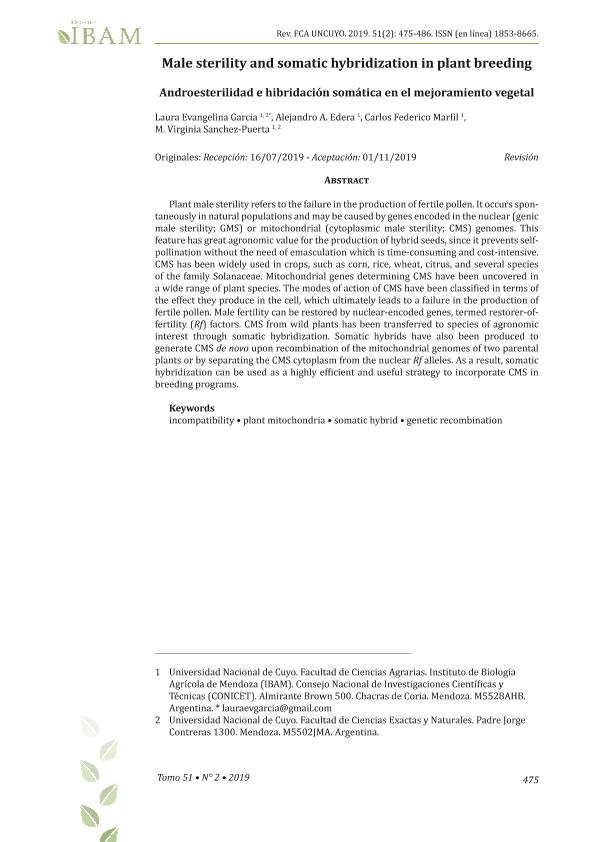Artículo
Male sterility and somatic hybridization in plant breeding
Garcia, Laura Evangelina ; Edera, Alejandro
; Edera, Alejandro ; Marfil, Carlos Federico
; Marfil, Carlos Federico ; Sánchez Puerta, María Virginia
; Sánchez Puerta, María Virginia
 ; Edera, Alejandro
; Edera, Alejandro ; Marfil, Carlos Federico
; Marfil, Carlos Federico ; Sánchez Puerta, María Virginia
; Sánchez Puerta, María Virginia
Fecha de publicación:
11/2019
Editorial:
Universidad Nacional de Cuyo
Revista:
Revista de la Facultad de Ciencias Agrarias de la Universidad Nacional de Cuyo
ISSN:
0370-4661
e-ISSN:
1853-8665
Idioma:
Inglés
Tipo de recurso:
Artículo publicado
Clasificación temática:
Resumen
Plant male sterility refers to the failure in the production of fertile pollen. It occurs spon-taneously in natural populations and may be caused by genes encoded in the nuclear (genicmale sterility; GMS) or mitochondrial (cytoplasmic male sterility; CMS) genomes. Thisfeature has great agronomic value for the production of hybrid seeds, since it prevents self-pollination without the need of emasculation which is time-consuming and cost-intensive.CMS has been widely used in crops, such as corn, rice, wheat, citrus, and several speciesof the family Solanaceae. Mitochondrial genes determining CMS have been uncovered ina wide range of plant species. The modes of action of CMS have been classified in terms ofthe effect they produce in the cell, which ultimately leads to a failure in the production offertile pollen. Male fertility can be restored by nuclear-encoded genes, termed restorer-of-fertility (Rf) factors. CMS from wild plants has been transferred to species of agronomicinterest through somatic hybridization. Somatic hybrids have also been produced togenerate CMS de novo upon recombination of the mitochondrial genomes of two parentalplants or by separating the CMS cytoplasm from the nuclear Rf alleles. As a result, somatichybridization can be used as a highly efficient and useful strategy to incorporate CMS inbreeding programs.
Palabras clave:
INCOMPATIBILITY
,
MALE STERILITY
,
MITOCHONDRIA
,
RECOMBINATION
Archivos asociados
Licencia
Identificadores
Colecciones
Articulos(IBAM)
Articulos de INST.DE BIOLOGIA AGRICOLA DE MENDOZA
Articulos de INST.DE BIOLOGIA AGRICOLA DE MENDOZA
Citación
Garcia, Laura Evangelina; Edera, Alejandro; Marfil, Carlos Federico; Sánchez Puerta, María Virginia; Male sterility and somatic hybridization in plant breeding; Universidad Nacional de Cuyo; Revista de la Facultad de Ciencias Agrarias de la Universidad Nacional de Cuyo; 51; 2; 11-2019; 475-486
Compartir



